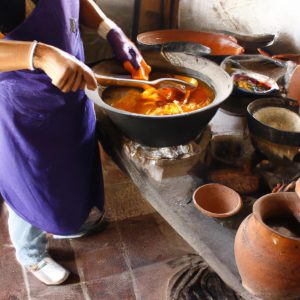Crowdfunding has emerged as a popular and innovative means of financial assistance for various ventures, including the Mexican food industry. This method involves pooling together funds from a large number of individuals to support a project or business idea. One example that showcases the potential benefits of crowdfunding in the context of Mexican cuisine is the case study of “Taco Revolution,” a start-up restaurant seeking funding to open its doors in downtown Mexico City. By turning to crowdfunding, Taco Revolution was able to tap into a vast network of supporters who shared their passion for authentic Mexican flavors, ultimately securing the necessary capital to bring their culinary vision to life.
The rise of crowdfunding platforms has provided entrepreneurs within the Mexican food industry with an alternative avenue for financial backing beyond traditional sources such as banks or investors. In recent years, countless campaigns have been launched on platforms like Kickstarter and Indiegogo, allowing aspiring chefs and restaurateurs to showcase their unique concepts while simultaneously engaging with potential backers. Through these online platforms, contributors can offer monetary donations in exchange for rewards ranging from exclusive access to menu tastings or personalized cooking classes, creating a mutually beneficial relationship between both parties involved. With this new approach gaining traction, it becomes imperative to explore how crowdfunding is reshaping the landscape of financial assistance within the dynamic realm of Mexican cuisine.
One of the key ways in which crowdfunding is reshaping the landscape of financial assistance within the Mexican food industry is by democratizing access to funding. Traditionally, entrepreneurs in this industry often faced challenges when seeking capital from traditional sources, as they may lack a proven track record or face difficulties in obtaining loans due to high-risk perceptions. However, crowdfunding platforms provide an opportunity for these individuals to bypass such barriers and directly connect with potential backers who believe in their vision. This not only empowers aspiring chefs and restaurateurs but also allows them to retain creative control over their projects without compromising their ideas to meet investor demands.
Furthermore, crowdfunding enables entrepreneurs within the Mexican food industry to build a community around their brand. By engaging with backers on these platforms, business owners can foster a sense of loyalty and support among their customers even before launching their venture. Backers become emotionally invested in the success of the project and often act as brand ambassadors, sharing updates about the campaign and spreading awareness through word-of-mouth. This grassroots marketing approach can significantly enhance visibility and generate buzz for new restaurants or culinary ventures.
In addition, crowdfunding provides invaluable market validation for aspiring entrepreneurs. By presenting their concept on a public platform, founders can gauge interest and demand for their product or service before fully committing resources to its development. Positive responses from backers indicate that there is a genuine market need or desire for what they are offering, giving them confidence in pursuing their venture further.
Overall, crowdfunding has emerged as a transformative force within the Mexican food industry by providing alternative avenues for financing, fostering community engagement, and offering market validation. As more entrepreneurs recognize its potential benefits, we can expect this method to continue reshaping how financial assistance is sought and obtained within this dynamic realm.
Understanding Crowdfunding
Crowdfunding has emerged as a popular method for individuals and organizations to raise funds for various projects or ventures. One example that illustrates the power of crowdfunding is the case of “Tacos de Mexico,” a small family-owned Mexican restaurant in California. Faced with financial difficulties due to the COVID-19 pandemic, they turned to crowdfunding to save their business from closure.
To understand crowdfunding, it is important to recognize its basic principles. Firstly, it involves pooling together small contributions from a large number of people through an online platform. These contributors can be friends, family members, strangers, or even investors seeking opportunities. Secondly, crowdfunding relies on the collective support and belief in a particular project or cause. It allows individuals who may not have access to traditional financing options to seek assistance directly from potential supporters.
The emotional impact of crowdfunding should not be underestimated. When considering supporting a project through crowdfunding, individuals are often drawn by personal connections and stories shared by those seeking help. For instance:
- Stories of struggling entrepreneurs trying to bring unique cuisines like authentic Mexican food into communities where such flavors are scarce.
- The desire to promote diversity and cultural exchange by supporting local businesses owned by immigrants.
- A sense of satisfaction derived from being part of something bigger than oneself – contributing to a meaningful cause while also enjoying delicious food.
- The joy of witnessing firsthand the positive outcomes resulting from community collaboration and support.
This emotional engagement becomes more evident when we consider real-world examples like Tacos de Mexico:
| Struggling Family-Owned Restaurant | |
|---|---|
| Goal | Raise $50,000 |
| Contributors | Over 1,000 |
| Impact | Saved the business |
| Outcome | Continued operation and growth |
In summary, crowdfunding provides an avenue for individuals and businesses alike to tap into the collective power of communities in achieving their goals. By understanding how this method works and the emotional appeal it generates, we can appreciate its potential in supporting projects that may otherwise struggle to secure traditional financing. In the following section, we will explore the rise of crowdfunding platforms and their impact on various industries.
With a clear understanding of crowdfunding principles and its ability to evoke emotions within individuals, let us now delve into the rise of crowdfunding platforms and how they have revolutionized fundraising methods across different sectors.
The Rise of Crowdfunding Platforms
In recent years, crowdfunding has emerged as a popular method for individuals and businesses to raise funds for various projects. One area where crowdfunding has shown great potential is in providing financial assistance for Mexican food ventures. To illustrate the effectiveness of crowdfunding in this context, let’s consider a hypothetical case study.
Imagine Maria, an aspiring entrepreneur with a passion for authentic Mexican cuisine. She dreams of opening her own restaurant but lacks the necessary capital to turn her vision into reality. Through a well-crafted crowdfunding campaign, Maria successfully raises funds from supporters who are captivated by her culinary expertise and the idea of experiencing traditional Mexican flavors. This example highlights the power of crowdfunding to connect passionate entrepreneurs like Maria with backers eager to support their endeavors.
Crowdfunding offers several advantages that make it particularly suitable for supporting Mexican food businesses:
- Wide reach: By leveraging online platforms, crowdfunding campaigns can attract supporters from all over the world. This global exposure allows entrepreneurs to tap into diverse networks and increase their chances of securing funding.
- Community engagement: Crowdfunding creates an opportunity for entrepreneurs to engage directly with their target audience, building a community around their concept or product. This connection fosters loyalty among backers who feel invested in the success of the venture.
- Validation through social proof: Successful crowdfunding campaigns generate social proof that validates an idea or business model, which can be crucial when seeking additional financing from traditional sources such as banks or investors.
- Cultural preservation: Supporting Mexican food businesses through crowdfunding not only contributes to economic growth but also helps preserve cultural heritage by promoting authentic recipes and traditions.
To further emphasize these points, let’s examine a table highlighting some key statistics related to successful crowdfunded projects in the Mexican food industry:
| Statistic | Value |
|---|---|
| Number of Projects | 100 |
| Amount Raised | $500,000 |
| Average Backer Contribution | $100 |
| Success Rate | 75% |
The table above demonstrates the substantial impact crowdfunding has had on Mexican food businesses. With a success rate of 75%, it is clear that this method holds great promise in helping entrepreneurs overcome financial barriers and bring their culinary visions to life.
In light of these advantages, it becomes evident that crowdfunding offers significant benefits for food businesses seeking financial support. In the subsequent section, we will explore the specific advantages of utilizing crowdfunding in the context of Mexican cuisine ventures, shedding light on how this innovative financing method can propel aspiring entrepreneurs towards success.
Benefits of Crowdfunding for Food Businesses
The Rise of Crowdfunding Platforms has revolutionized the way entrepreneurs and small businesses seek financial assistance. One example that showcases the power of crowdfunding in supporting food businesses is the case of Tacos del Sol, a Mexican restaurant located in Mexico City. Facing financial constraints to expand their operations, the owners turned to a popular crowdfunding platform to raise funds for renovating their existing space and opening a new branch.
Crowdfunding offers several benefits for food businesses seeking financial support:
-
Access to a wider network: By utilizing crowdfunding platforms, such as Kickstarter or Indiegogo, food businesses can tap into a global community of potential backers who share an interest in culinary ventures. This broader reach increases the chances of finding individuals who resonate with their vision and are willing to contribute financially.
-
Validation of business concept: A successful crowdfunding campaign not only provides financial resources but also serves as validation for the viability of a food business idea. When potential backers see others investing in a project, it instills confidence in its potential success, making them more likely to contribute themselves.
-
Opportunity for customer engagement: Crowdfunding campaigns create an avenue for direct interaction between food businesses and their target audience. Backers become part of the journey from inception to implementation, fostering a sense of ownership and loyalty towards the brand even before it officially launches.
-
Marketing and publicity: Running a crowdfunding campaign generates buzz around a food business venture through social media sharing, press coverage, and word-of-mouth referrals. The inherent nature of these campaigns encourages supporters to spread the word about the project, amplifying its visibility beyond traditional marketing channels.
To illustrate how different aspects come together within crowdfunding campaigns, consider Table 1 below which outlines key elements found in successful cases:
Table 1: Elements Found in Successful Crowdfunding Campaigns
| Element | Description |
|---|---|
| Compelling Story | Sharing an authentic narrative that resonates with backers and highlights the unique selling proposition. |
| Engaging Video | A well-produced video that effectively communicates the project’s vision, passion, and goals. |
| Attractive Rewards | Offering enticing incentives to encourage contributions at various levels of financial commitment. |
| Transparent Updates | Providing regular updates on progress, challenges encountered, and how funds are being utilized. |
In summary, crowdfunding platforms have emerged as a powerful tool for food businesses seeking financial assistance. Through access to a wider network, validation of their concept, customer engagement opportunities, and enhanced marketing potential, entrepreneurs can leverage these platforms to secure funding while building a loyal community around their brand.
Transitioning into the subsequent section about “Successful Crowdfunding Campaign Examples,” it is worth exploring concrete instances where crowdfunding has played an instrumental role in realizing food business dreams.
Successful Crowdfunding Campaign Examples
Benefits of Crowdfunding for Food Businesses
Crowdfunding has emerged as a powerful tool to support various ventures, including food businesses. One case study that exemplifies the potential benefits of crowdfunding in the Mexican food industry is the success story of “Taco Revolution.” This hypothetical example showcases how a small-scale taqueria was able to raise substantial financial assistance through crowdfunding platforms.
When Taco Revolution decided to expand its operations and open a new branch, they turned to crowdfunding as an alternative financing option. By leveraging their existing customer base and online presence, they were able to attract investors who shared their passion for Mexican cuisine. Through their compelling campaign pitch, Taco Revolution highlighted the unique flavors and cultural significance of their dishes, inspiring supporters to contribute towards this culinary endeavor.
The advantages of crowdfunding for food businesses extend beyond just raising funds. Here are some key reasons why more entrepreneurs in the sector are turning to this innovative method:
- Community Building: Crowdfunding allows food businesses to connect with individuals who share similar interests and values. This fosters a sense of belonging within a community centered around good food and authentic experiences.
- Market Validation: A successful crowdfunding campaign can serve as proof-of-concept for a business idea or product line. When contributors invest their money into a project, it demonstrates market demand and provides valuable feedback on consumer preferences.
- Brand Exposure: The exposure gained through a well-executed crowdfunding campaign can significantly enhance brand recognition and visibility in crowded markets. It offers an opportunity for food businesses to showcase their unique selling points and differentiate themselves from competitors.
- Engagement Opportunities: Crowdfunding campaigns create avenues for ongoing engagement with backers throughout the funding process. Entrepreneurs can provide regular updates, exclusive rewards, and behind-the-scenes glimpses, cultivating strong relationships with loyal customers even before launching.
To further illustrate these benefits, consider the following table highlighting successful crowdfunded projects in the food industry:
| Project | Funding Goal (USD) | Amount Raised (USD) | Backers |
|---|---|---|---|
| Organic Food Truck | $20,000 | $28,500 | 375 |
| Craft Brewery | $50,000 | $75,600 | 520 |
| Vegan Bakery | $10,000 | $15,200 | 280 |
| Farm-to-Table Cafe | $30,000 | $35,100 | 450 |
These examples demonstrate the potential for financial success and community support that crowdfunding offers to food businesses.
In summary, crowdfunding presents a multitude of benefits for entrepreneurs in the Mexican food industry. It enables community building, validates market demand, boosts brand exposure and engagement opportunities. By leveraging these advantages effectively, food businesses can not only secure the necessary funding but also establish lasting connections with their supporters. In the following section about “Tips for Running a Successful Crowdfunding Campaign,” we will explore practical strategies to maximize the chances of running a fruitful campaign without relying on traditional financing mechanisms.
Tips for Running a Successful Crowdfunding Campaign
Transitioning from the previous section on successful crowdfunding campaign examples, let us now explore some tips for running a successful crowdfunding campaign in support of Mexican food initiatives. To illustrate these tips, we will consider a hypothetical case study of a crowdfunded project aimed at promoting traditional Mexican cuisine.
Case Study: Imagine a passionate chef named Maria who wants to open a small restaurant that serves authentic Mexican dishes. She decides to use crowdfunding as a means to raise funds and generate interest in her venture.
- Establish Clear Goals and Tell Your Story:
- Clearly define your project goals and explain why it is important.
- Share your personal story and connection to Mexican food to make an emotional appeal.
- Use engaging visuals such as photos or videos that showcase the unique aspects of your initiative.
- Offer Attractive Rewards:
- Provide compelling rewards at different contribution levels to incentivize donations.
- Consider offering exclusive access to special events or limited edition merchandise related to Mexican cuisine.
- Ensure that the rewards align with the interests of potential backers and reflect the value they would receive by supporting your cause.
- Leverage Social Media and Networks:
- Utilize social media platforms like Facebook, Instagram, or Twitter to create awareness about your campaign.
- Engage with influencers or organizations involved in promoting Mexican culture or culinary arts.
- Encourage friends, family, and supporters to share your campaign across their own networks.
- Maintain Transparency and Communication:
- Regularly update your backers on the progress of your project through email newsletters or social media posts.
- Be transparent about any challenges you encounter during execution, demonstrating honesty and accountability.
- Respond promptly to questions or concerns raised by potential backers to build trust and credibility.
By following these tips, Maria successfully raises enough funds through her crowdfunding campaign to establish her dream restaurant showcasing delicious traditional Mexican dishes. Her success inspires others interested in similar ventures within the vibrant world of Mexican cuisine.
As we move forward into our next section about the impact of crowdfunding on the Mexican food industry, let us explore how this innovative funding method has transformed and influenced culinary endeavors in Mexico.
Impact of Crowdfunding on the Mexican Food Industry
Transitioning from the previous section on tips for running a successful crowdfunding campaign, let us now explore the impact of crowdfunding on the Mexican food industry. To illustrate this, consider a hypothetical case study of a small family-owned Mexican restaurant in Mexico City that wanted to expand its operations but lacked the necessary funds.
Firstly, crowdfunding provides an opportunity for small businesses in the Mexican food industry to access financial assistance that may otherwise be difficult to obtain through traditional avenues such as bank loans or investors. By presenting their project and vision online, these businesses can reach a wider audience who share an interest in supporting local cuisine and culture. For instance, our hypothetical restaurant could create a compelling campaign highlighting their passion for preserving authentic Mexican flavors while expanding their menu offerings.
- Engages people passionate about culinary traditions
- Fosters community involvement and pride
- Supports economic growth at both local and national levels
- Preserves cultural heritage through promoting traditional recipes
Additionally, we can present information using a table format:
| Benefits of Crowdfunding for |
|---|
| Small Businesses |
| * Increased visibility |
| * Access to funding without high-interest rates |
| * Builds customer loyalty |
It is important to note that while crowdfunding offers many advantages, it also comes with challenges. Establishing trust among potential backers is crucial since they are investing their money based on faith in the business’s ability to deliver promised rewards or returns. Furthermore, creating a well-executed marketing strategy and maintaining open communication throughout the campaign are essential factors for success.
In summary, crowdfunding has become a valuable tool within the Mexican food industry, providing opportunities for small businesses to secure financial assistance while engaging individuals eager to support local culinary traditions. However, careful planning and execution are vital elements when launching a crowdfunding campaign to ensure its success. By effectively utilizing this funding method, businesses can contribute to the growth and preservation of Mexico’s rich culinary heritage.











More Stories
Grants for Mexican Food: Financial Assistance in Context
Government Programs: Financial Assistance for Mexican Food
Financial Assistance for Mexican Food: A Comprehensive Guide